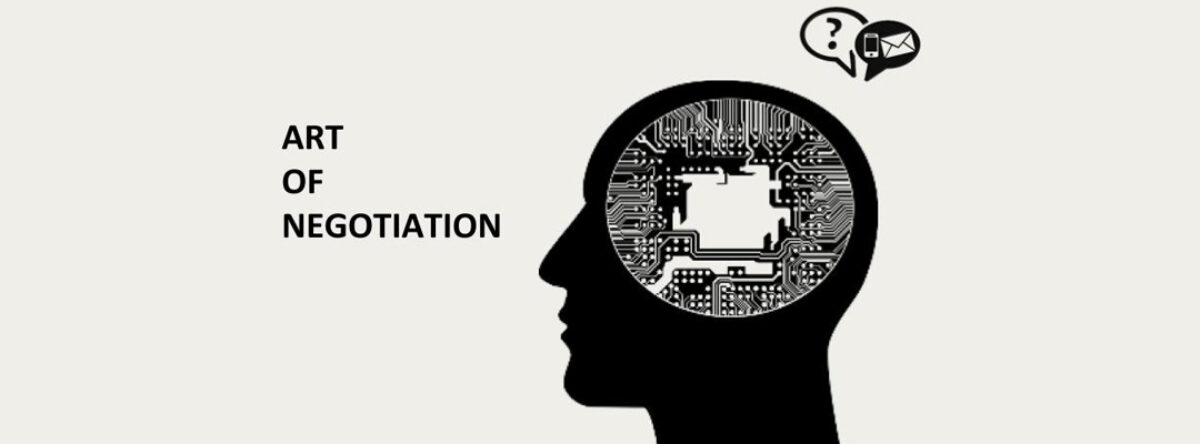Request a call back
Contact Information
523 Sylvan Ave, 5th Floor Mountain
View, CA 94041USA
Request a call back
Contact Information
523 Sylvan Ave, 5th Floor Mountain
View, CA 94041USA
May 24, 2024
admin
No Comments
Art of Negotiation
What is Negotiation?
Negotiation is the process by which two or more people or entities with some conflict of interest who stand to mutually benefit by collaboration find ways and means to collaborate with each other so that the partnership is profitable to both. It is a method to settle differences and reach compromise and agreement to achieve mutual goals. Unlike arbitration or mediation which involves a third party in bringing two parties to an agreement, negotiation is directly held between parties trying to cooperate and collaborate. Bargaining, another related concept is a sub process within negotiation focused on best outcome for one’s party while negotiation as such is focused on good outcomes for both parties. Bargaining is transactional. Negotiation is relationship-centric.
Key Negotiation Skills
Top negotiation experts differ considerably in what they consider key skills to be an effective negotiator but there are certain skills which are universally recommended by experts. These are:
Adequate Preparation
Any successful negotiation requires thorough homework before you arrive at the negotiating table to meet the partner from the opposite side. Before you negotiate you need to have a clear understanding of:
- Your past experience in negotiation and relationship with the other party, if applicable
- Your and the other party’s:
- Interests
- Long and short-term relationship and collaboration goals
- Desired Outcomes
- Likely strategy approach to negotiation
- Potential areas of conflict of interests
- Solutions to redress these
- Analysis of possible outcomes including both how the negotiation game may proceed (scenario planning) and end result of various solutions and approach to negotiation
- Risks involved in various outcomes
- Best alternative to negotiated agreement (BATNA) or the lowest outcome you are willing to accept
This is called interest based analysis by the Harvard Negotiation Project and is based on game theory.
Strong Interpersonal Communication Skills
The core part of negotiation is primarily about communication and handling the interpersonal relationship well. This requires a range of communication skills that includes:
The core part of negotiation is primarily about communication and handling the interpersonal relationship well. This requires a range of communication skills that includes:
- Good oral and written language skills especially the ability to communicate clearly and rationally
- Attention to your and other party’s body language and tone
- Establishing trust
- Active listening, asking questions, seeking clarifications, validation through rephrasing and note-taking
- Focus on trying to find the common ground
- Clear statement of outcomes: actionable, deliverables, measurable et cetera.
- Non-manipulative collaborative rather than competitive techniques
- Collaborative rather than competitive style of communication
Cognitive Skills
Negotiation requires dynamic problem solving which involves effective use of cognitive skills during the negotiation process. This includes:
- Focus on problem solving
- Active use of reasoning in persuasion
- Control over emotions and their expression during interactions particularly negative emotions like anger, frustration, desire to dominate, impatience, greed et cetera
- Ability to take deliberative decisions sometimes during the course of negotiation interactions to break the stalemate and arrive at reasonable compromises
Knowing When Things Are Bad
Negotiation isn’t always about compromising. Sometimes the other party may employ tactics which work severely to your disadvantage. The following are some key signs that things are to your disadvantage. In some such situations, you can change tactics to counter that of the other party. In other situations it is best to walk away.
- If they are contemptuous, belittling or dismissive
- If they are inflexible, dominating, demanding
- If they are indifferent, avoidant and non-committal
- If they are threatening, manipulating
Write to us at customersuccess@crossoverleaders.com or Whatsapp/Call on 8688910359
#leadershiptraining #crossoverleadership #leadershipdevelopment #peopledevelopment
© 2024 Crossover Leadership Journeys. All Rights Reserved.
